裕兴新概念英语第一册笔记105
新概念英语第一册课文翻译及学习笔记Lesson105

新概念英语第一册课文翻译及学习笔记Lesson105【课文】THE BOSS:Where's Sandra, Bob? I want her.BOB: Do you want to speak to her?THE BOSS:Yes, I do. I want her to come to my office. Tell her to come at once.SANDRA: Did you want to see me?THE BOSS:Ah, yes, Sandra. How do you spell "intelligent'? Can you tell me?SANDRA: I-N-T-E-L-L-I-G-E-N-T.THE BOSS:That's right. You've typed it with only one 'L'. This letter's full of mistakes. I want you to type it again.SANDRA: Yes, I'll do that. I'm sorry about that.THE BOSS:And here's a little present for you.SANDRA: What's it?THE BOSS:It's a dictionary. I hope it'll help you.【课文翻译】老板:鲍勃,桑德拉在哪儿?我要找她。
鲍勃:您要同她谈话吗?老板:是的,我要她到我的办公室来。
叫她马上就来。
桑德拉:您找我吗?老板:啊,是的,桑德拉。
"intelligent" 怎样拼写?你能告诉我吗?桑德拉:I-N-T-E-L-L-I-G-E-N-T。
老板:对的。
但你只打了1个“L”。
裕兴新概念英语第一册笔记(完整版)
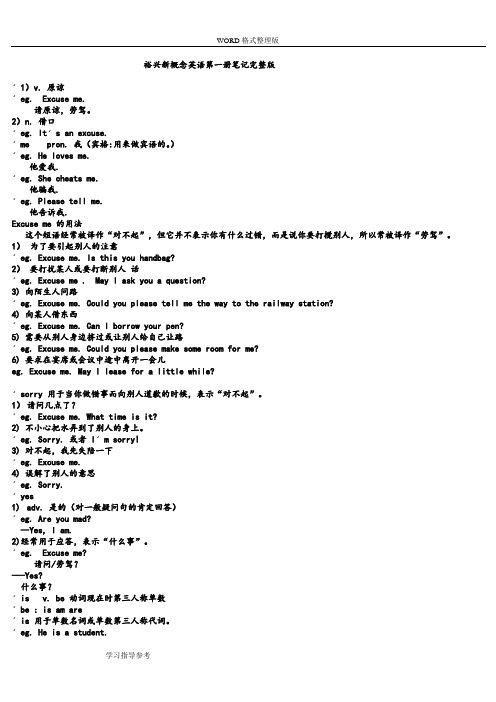
裕兴新概念英语第一册笔记完整版΄1)v. 原谅΄eg. Excuse me.请原谅,劳驾。
2)n. 借口΄eg. It΄s an excuse.΄me pron. 我(宾格:用来做宾语的。
)΄eg. He loves me.他爱我.΄eg. She cheats me.他骗我.΄eg. Please tell me.他告诉我.Excuse me 的用法这个短语经常被译作“对不起”,但它并不表示你有什么过错,而是说你要打搅别人,所以常被译作“劳驾”。
1)为了要引起别人的注意΄eg. Excuse me. Is this you handbag?2)要打扰某人或要打断别人话΄eg. Excuse me . May I ask you a question?3) 向陌生人问路΄eg. Excuse me. Could you please tell me the way to the railway station?4) 向某人借东西΄eg. Excuse me. Can I borrow your pen?5) 需要从别人身边挤过或让别人给自己让路΄eg. Excuse me. Could you please make some room for me?6) 要求在宴席或会议中途中离开一会儿eg. Excuse me. May I lease for a little while?΄sorry 用于当你做错事而向别人道歉的时候,表示“对不起”。
1)请问几点了?΄eg. Excuse me. What time is it?2) 不小心把水弄到了别人的身上。
΄eg. Sorry. 或者 I΄m sorry!3) 对不起,我先失陪一下΄eg. Excuse me.4) 误解了别人的意思΄eg. Sorry.΄yes1)adv. 是的(对一般疑问句的肯定回答)΄eg. Are you mad?--Yes, I am.2)经常用于应答,表示“什么事”。
新概念英语第一册Lesson105~110课文翻译及学习笔记
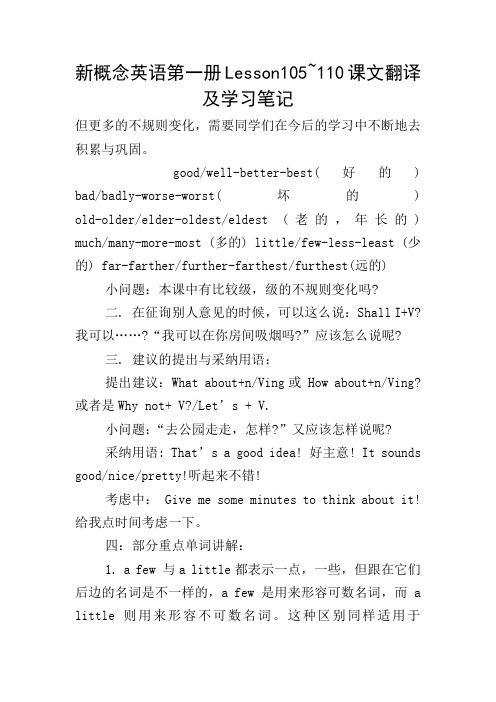
新概念英语第一册Lesson105~110课文翻译及学习笔记但更多的不规则变化,需要同学们在今后的学习中不断地去积累与巩固。
good/well-better-best(好的) bad/badly-worse-worst(坏的) old-older/elder-oldest/eldest (老的,年长的) much/many-more-most (多的) little/few-less-least (少的) far-farther/further-farthest/furthest(远的) 小问题:本课中有比较级,级的不规则变化吗?二. 在征询别人意见的时候,可以这么说:Shall I+V? 我可以……?“我可以在你房间吸烟吗?”应该怎么说呢?三. 建议的提出与采纳用语:提出建议:What about+n/Ving或 How about+n/Ving? 或者是Why not+ V?/Let’s + V.小问题:“去公园走走,怎样?”又应该怎样说呢?采纳用语: That’s a good idea! 好主意! It sounds good/nice/pretty!听起来不错!考虑中: Give me some minutes to think about it! 给我点时间考虑一下。
四:部分重点单词讲解:1. a few 与a little都表示一点,一些,但跟在它们后边的名词是不一样的,a few 是用来形容可数名词,而 a little 则用来形容不可数名词。
这种区别同样适用于few&little,many&much (每一组的前者均修饰可数名词,后者修饰不可数名词)。
2. teaspoonful adj. 一茶匙的,满茶匙的;这是一个合成词,由teapoon(茶匙)+ful两部分合成。
ful是后缀,表示满的(=full)。
此类的词有很多,请同学们猜猜这些词都是什么意思?handful, mouthfu, thankful, careful,hopeful.3. 口语常用语: What a pity!真遗憾! It doesn’t matter. 没关系。
裕兴新概念英语笔记:Lesson 105 Full of mistakes
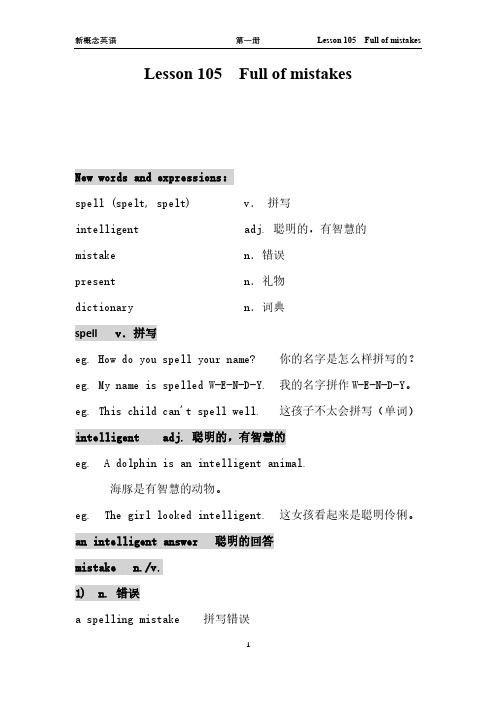
Lesson 105 Full of mistakesNew words and expressions:spell (spelt, spelt) v.拼写intelligent adj. 聪明的,有智慧的mistake n.错误present n.礼物dictionary n.词典spell v.拼写eg. How do you spell your name? 你的名字是怎么样拼写的?eg. My name is spelled W-E-N-D-Y. 我的名字拼作W-E-N-D-Y。
eg. This child can't spell well. 这孩子不太会拼写(单词)intelligent adj. 聪明的,有智慧的eg. A dolphin is an intelligent animal.海豚是有智慧的动物。
eg. The girl looked intelligent. 这女孩看起来是聪明伶俐。
an intelligent answer 聪明的回答mistake n./v.1) n. 错误a spelling mistake 拼写错误make a mistake 做错,犯错eg. There is no mistake about it. 那毫无错误。
2) v.误解,弄错,误会mistake the date 弄错日期mistake…for…把…误为…mistake sympathy for love 误将同情当爱情present n./ adj. /v.1)[ˈprezənt] n.礼物 present 指礼物的一般性用语gift 是稍正式的说法a birthday present 生日礼物2) adj.出席的反义词是absenteg. A lot of students were present at the meeting.很多学生出席那会议。
3) [priˈzənt] v. 赠送,呈献,奉送eg. The mayor presented the prizes in person.市长亲自颁奖。
新概念英语第一册LessonL105-106(39张)
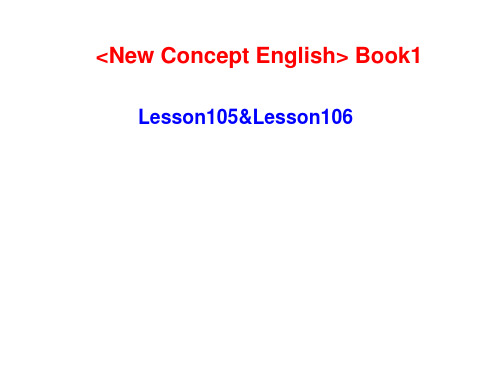
Grammer
宾语从句 直接引引语变间接引语(二)
Ann says to him, 'Carry the heavy box .' 祈使句
ask sb. to do sth. 要求某人做某事 Ann asks him to carry the heavy box.
step1.人称变化
step2.句式变化
L105 Full of mistakes 错误百出
T: Where's Sandra, Bob? I want her. B: Do you want to speak to her? T: Yes, I do. I want her to cometo my office. Tell her to comeat
<New Concept English> Book1
Lesson105&Lesson106
Lesson 105 Full of mistakes Lesson 106 I want you/him/her to...
New words
spell
/spel/
v. 拼写
intelligent /in'teliʒənt/ adj. 聪明的,有智慧的
once. S: Did you want to see me? T: Ah, yes, Sandra. How do you spell "intelligent'?
Can you tell me? S: I-N-T-E-L-L-I-G-E-N-T. T:That's right. You've typed it with only one 'L' .
新概念英语一册 第105 106课
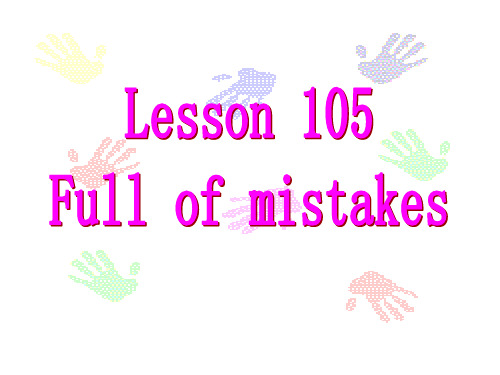
2) v. 误解,弄错,误会 mistake – mistook – mistaken mistake … for … 把…误认为
我想要一些果汁。 I want some juice. 我想要回家。 I want to go home.
want sb. (宾格) to do sth. tell sb. (宾格) to do sth. tell sb. (宾语) not to do sth.
我想要他打扫房间。
I want him to clean the room.
The boss is telling her to type the letter now.
She told Peter to watch the baby carefully.
Tell her not to break that vase.
I want you to tell them not to talk in the library.
be full of … 充满了…
这个袋子里装满了钱。
The bag is full of money. 她的眼睛里都是泪水。
be sorry about … 对…很抱歉
I’m sorry about your grandpa.
ห้องสมุดไป่ตู้
对你爷爷的事情,我感到很遗憾。
我对这个错误感到很抱歉。 I’m sorry about the mistake.
spell
裕兴新概念英语笔记第1册到第3册精品笔记--可编辑
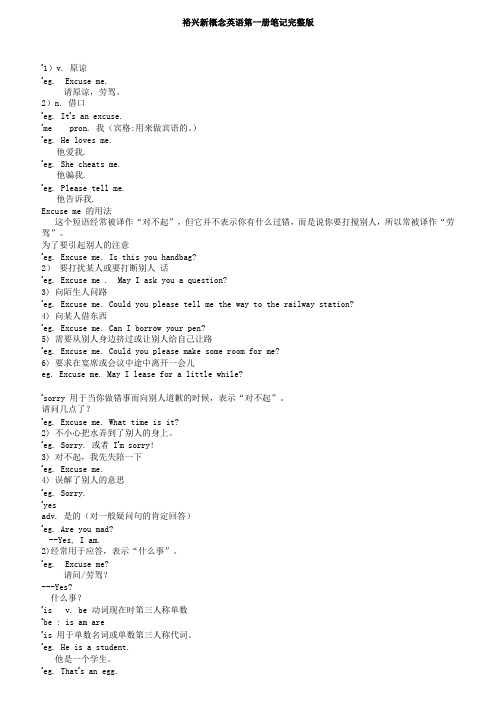
裕兴新概念英语第一册笔记完整版΄1)v. 原谅΄eg. Excuse me.请原谅,劳驾。
2)n. 借口΄eg. It΄s an excuse.΄me pron. 我(宾格:用来做宾语的。
)΄eg. He loves me.他爱我.΄eg. She cheats me.他骗我.΄eg. Please tell me.他告诉我.Excuse me 的用法这个短语经常被译作“对不起”,但它并不表示你有什么过错,而是说你要打搅别人,所以常被译作“劳驾”。
为了要引起别人的注意΄eg. Excuse me. Is this you handbag?2)要打扰某人或要打断别人话΄eg. Excuse me . May I ask you a question?3) 向陌生人问路΄eg. Excuse me. Could you please tell me the way to the railway station?4) 向某人借东西΄eg. Excuse me. Can I borrow your pen?5) 需要从别人身边挤过或让别人给自己让路΄eg. Excuse me. Could you please make some room for me?6) 要求在宴席或会议中途中离开一会儿eg. Excuse me. May I lease for a little while?΄sorry 用于当你做错事而向别人道歉的时候,表示“对不起”。
请问几点了?΄eg. Excuse me. What time is it?2) 不小心把水弄到了别人的身上。
΄eg. Sorry. 或者 I΄m sorry!3) 对不起,我先失陪一下΄eg. Excuse me.4) 误解了别人的意思΄eg. Sorry.΄yesadv. 是的(对一般疑问句的肯定回答)΄eg. Are you mad?--Yes, I am.2)经常用于应答,表示“什么事”。
裕兴新概念英语第一册笔记(完整版)

裕兴新概念英语第一册笔记完整版΄1)v. 原谅΄eg. Excuse me.请原谅,劳驾。
2)n. 借口΄eg. It΄s an excuse.΄me pron. 我(宾格:用来做宾语的。
)΄eg. He loves me.他爱我.΄eg. She cheats me.他骗我.΄eg. Please tell me.他告诉我.Excuse me 的用法这个短语经常被译作“对不起”,但它并不表示你有什么过错,而是说你要打搅别人,所以常被译作“劳驾”。
1)为了要引起别人的注意΄eg. Excuse me. Is this you handbag?2)要打扰某人或要打断别人话΄eg. Excuse me . May I ask you a question?3) 向陌生人问路΄eg. Excuse me. Could you please tell me the way to the railway station?4) 向某人借东西΄eg. Excuse me. Can I borrow your pen?5) 需要从别人身边挤过或让别人给自己让路΄eg. Excuse me. Could you please make some room for me?6) 要求在宴席或会议中途中离开一会儿eg. Excuse me. May I lease for a little while?΄sorry 用于当你做错事而向别人道歉的时候,表示“对不起”。
1)请问几点了?΄eg. Excuse me. What time is it?2) 不小心把水弄到了别人的身上。
΄eg. Sorry. 或者 I΄m sorry!3) 对不起,我先失陪一下΄eg. Excuse me.4) 误解了别人的意思΄eg. Sorry.΄yes1)adv. 是的(对一般疑问句的肯定回答)΄eg. Are you mad?--Yes, I am.2)经常用于应答,表示“什么事”。
- 1、下载文档前请自行甄别文档内容的完整性,平台不提供额外的编辑、内容补充、找答案等附加服务。
- 2、"仅部分预览"的文档,不可在线预览部分如存在完整性等问题,可反馈申请退款(可完整预览的文档不适用该条件!)。
- 3、如文档侵犯您的权益,请联系客服反馈,我们会尽快为您处理(人工客服工作时间:9:00-18:30)。
Lesson 105--spell v. 拼写--How do you spell your name? 你的名字是怎么拼写的?--My name is Spelled W-E-N-D-Y. 我的名字拼作W-E-N-D-Y.--This child can’t spell well.这个孩子不大会拼写。
--intelligent adj. 聪明的,有智慧的--A dolphin is an intelligent animal.海豚是很聪明的动物。
--The girl looked intelligent. 这女孩看起来是聪明伶俐。
--An intelligent auswer聪明的回答--mistake n./ v.1) n. 错误--a spelling mistake 拼写错误--make a mistake 做错,犯错--There is no mistake about it. 那毫无错误。
2) v. 误解,弄错,误会mistake the date 弄错日期--mistake…for…把…误为…--mistake sympathy for love 误将同情当爱情--present n./ adj./v.1) n. 礼物--present 指礼物的一般性用语--gift 是稍正式的说法--a birthday present 生日礼物2)adj. 出席的反意词absent--A lot of students were present at the meeting. 很多学生出席那会议。
3)做动词的时候读音发生了改变【pri’zent】赠送,呈献,奉送--The mayor presented the prizes in person.市长亲自颁奖--present sth to sb = present sb with sth 把…赠送给某人--The principal presented a diploma to each of the graduates.--dictionary n. 词典an English-Chinese dictionary英汉词典--I looked up the word in the dictionary. 我在词典中查找单词--A walking dictionary 活字典动词不定式不定式两种形式:一是带to 的不定式,一是不带to的不定式。
不定式后面的动词必须是原形。
1. 不定式在句中可作主语,表语,宾语、和补语等等。
1)用作主语To see is to believe 百闻不如一见当代英语常用it作为语法上的主语,即形式主语,将真实主语(不定式)放在谓语之后。
--It always pays to tell the truth.2)用作表语--Your task is to look after the baby. 你的任务是照顾这小孩。
3)用作宾语(动词+to…)--They want to learn French. --I hope to pass in maths.有许多动词可以带名词/代词然后再跟不定式,即动词+名词/代词+to…--I want you to help me. 我想让你帮我。
--tell them to carry the box.告诉他们搬这个箱子2.动词不定式的否定形式是在to之前加not.--He decided not to tell his mother. 他决定不告诉他的妈妈。
--My mother told me not to close the door.妈妈叫我不关门。
--Tell your children not to move the box.告诉你的孩子不要动那个箱子3) to是小品词,后面加动词原形;to是介词后面则接名词,代词或动名词。
--My mother asked me to air the room.妈妈让我给房间通风。
(to是小品词)--I am listening to the radio.(to是介词)4)有些动词如:hear, see, make, let 等后面是加不带to的不定式。
--I heard you call me. 我听见你叫我了。
--The teacher always makes the students clean the office.--Will you let me go home?Question: What was Sandra’s present?Where’s Sandra,bob? I want her .--Do you know where lucy is , the boss wants her.你知道lucy在那么?老板找她。
Do you want to speak to her? 你要同她谈话吗?--want to speak 不定式结构--want to do sth 想要做某事--I want to buy a new car. –She wants to go to England.她想去英国。
Yes, I do. I want her to come to my office. Tell her to come at once.--want sb to do sth 想让某人做某事tell sb. To do sth. 告诉某人做某事--I want them to move out. 我想让他们搬出去--Tell Mrs. Lee to answer the phone. 告诉李太太听电话。
--at once 立刻--You must leave at once. 你必须马上离开。
Did you want to see me? Oh,yes , Sandra , how do you spell ‘intelligent’, can you tell me? I-N-T-E-L –L-I-G-E-N-T.--How do you spell….? ….怎样拼写That’s right. You’ve typed it with only one ‘L’. This letter’s full of mistakes.I want you to type it again.That’s right= Tha t’s correct.You’ve typed it with only one ‘L’/此句是现在完成时,强调过去某个时间发生的动作对现在的影响。
句中的it指intelligent这个词,with 是介词,在这里是指“用”。
--be full of 充满了…--The glass if full of milk.--The bookcase is full of books.Yes, I’ll do that. I’m sorry about that.--be sorry about 对某事很抱歉--I’m sorry about the mistake. 我对这个错误感到很抱歉--I am sorry about the noise.--be sorry to do 很抱歉做某事--I am sorry to bother you, but we need to discuss our plan.很抱歉来烦你,但我们需要讨论一下我们的计划。
And here’s a little present for you.--and 相当于“于是”,“因此”,有承上启下的作用,使上下文联系更紧密。
--Here’s a little a present. (倒装句)正常语序应为:A little present is here.小结:短语:动词不定式的用法。
--I want her…我想找她--want to do sth 想要做某事--want sb to do 想让某人做…--How do you spell…? ….怎么拼写?--be full of 充满…--I’m sorry about 对…感到抱歉106--carry v. 携带--carry sth with sb 随身携带--I never carry a big sum of money with me. 我从不随身携带巨款。
--The mother is carrying her baby in her arms. 那个母亲怀里抱着婴儿。
--carry on 继续做….--Carry on with your work. 续续你的工作吧。
--He carried on reading. 他继续读书。
--correct v./ adj.1) v. 改正,纠正--Correct me if I say anything wrong. 如果我说话有任何错误请指正。
--correct one’s watch 校准表--correct a bad habit 纠正坏习惯2)adj. 对的,正角的--a correct answer 正确的答案the correct spelling 正确的写法3)adj. 合乎礼节的,妥当的,恰当的--the correct dress for a ceremony--适于典礼穿的服装--It is correct to do…做…是适当的--It is not correct to speak with your mouth full. 说话时满口食物是不礼貌的。
--keep v.1) 保存, 保留--Keep your money in a safe place. 把钱放在安全的地方.--keep…for…为了…保留…---keep this for future use1) 使维持(某种状态)--This coat will keep you warm.--keep….doing…让…继续--She kept me waiting for half an hour. 她让我等了半个钟头。
--keep the fire burning 不要让火熄掉3)继续做…--The telephone kept ringing until I answered. 电话铃一直响着,直到我去接才停。
